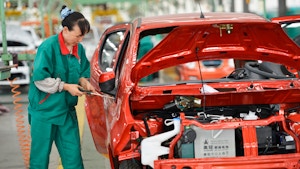#clean energy 新闻

The renewables giant is shifting roles away from its regional headquarters to Japan, Australia and Taiwan, while relocating some functions to Malaysia to cut costs. However, the firm anticipates ending the year with a similar headcount.

Green energy tax credits have boosted US construction jobs and attracted younger workers, but could be on the chopping block.

Chinese international cooperation mechanisms such as the Belt and Road Initiative could fill the gaps left by US withdrawal.

Flagship EU fund to support fossil fuel workers and communities risks mad spending rush, says exclusive European Commission data.
#clean energy 观点

China pursued their low-carbon agenda not in response to climate change, but because of its own energy insecurity.

Local communities and traditional Islamic boarding schools are pushing back on renewable energy projects that prioritise technical and economic benefits over social and ecological considerations.

Through recycling, R&D and diversifying imports as well as by facilitating a regional market for rare earth minerals, the dependence on the Chinese supply chain can be reduced.

Although artificial intelligence (AI) offers positive benefits for Southeast Asia’s climate battle, the region should not look at its usage through rose-tinted glasses. Without careful consideration, such systems may inadvertently undermine and be counterintuitive to the very climate goals that they aim to achieve.
#clean energy 视频

There is consensus that coal needs to be retired early in Asia, but the mechanisms for financing the phase-out are not clear. This mini-documentary examines how transition credits work and whether they can fund Southeast Asia's equitable switch to clean power.

EB工作室
Our urban infrastructure is responsible for almost 40 per cent of global carbon emissions. Climate solutions need to include the biggest energy guzzlers, clean energy and retrofitting old buildings.

Vietnam's wind market is thriving, but more work lies ahead if the country wants to power its booming economy without imperilling its people and the planet.

Southeast Asian nations are racing to bring clean, affordable power to their people, but one country is outrunning them all. How can states make their renewable energy transition a success?
#clean energy 播客

The ESG head of the Philippine power company arm tells the EB Podcast that sustainability needs to be communicated not as a “progressive idea” but a business strategy that benefits the bottom line.

Trump 2.0 may prove to be a "bump in the road" for climate action, but banks and investors in Asia see growth and opportunity in the region for decarbonisation as climate risks grow.

David Antonioli says current rules spur piecemeal offsetting instead of enabling faster growth of climate ventures. He expects pushback to his ideas in a market polarised over integrity issues, but wants players to think big-picture.

碳与气候
‘Five years ago, everyone wanted to be Elon Musk’: Where is climate tech in Southeast Asia now?
Entrepreneur Steve Melhuish tells the EB Podcast where the biggest opportunities to reduce emissions and make money are in Southeast Asia, and why finding the right economic incentives is critical for climate tech startups.
#clean energy 新闻发布稿

Smart Energy Week
Triumph for renewable energy: Smart Energy Week ends on a high

United Nations Economic and Social Commission for Asia and the Pacific (ESCAP)
Indonesia sets path for climate-friendly cooling with National Cooling Action Plan
#clean energy 研究

British Embassy Manila and Eco-Business
Electric vehicles in the Philippines: Business opportunities, market barriers, and policy signals












